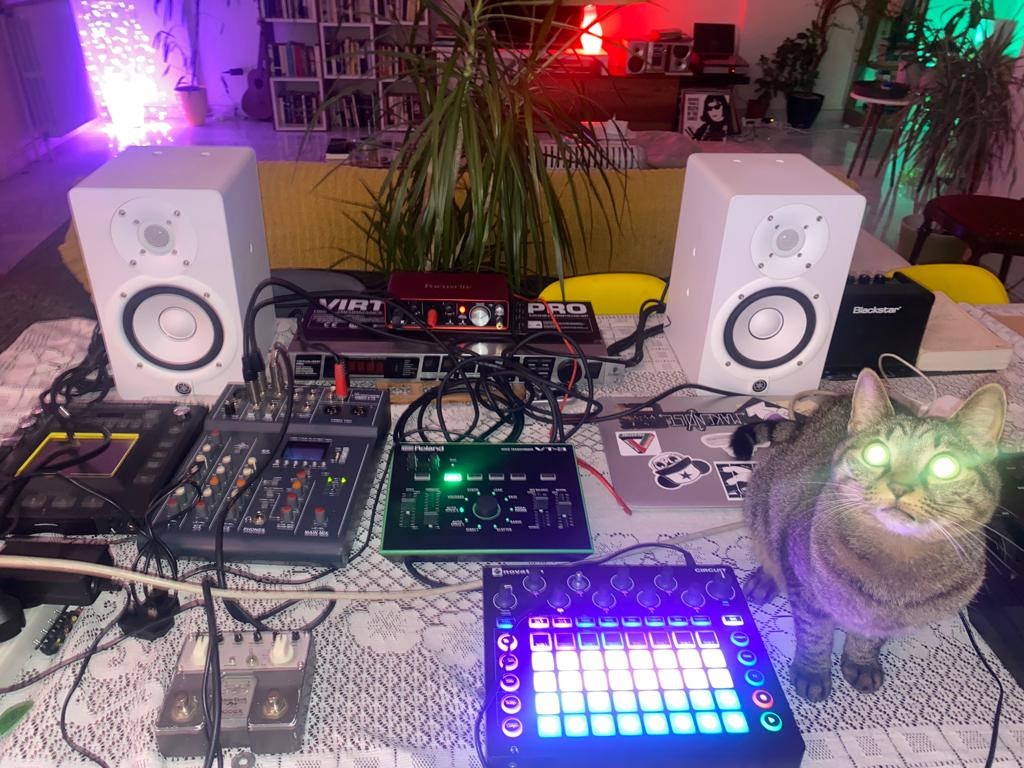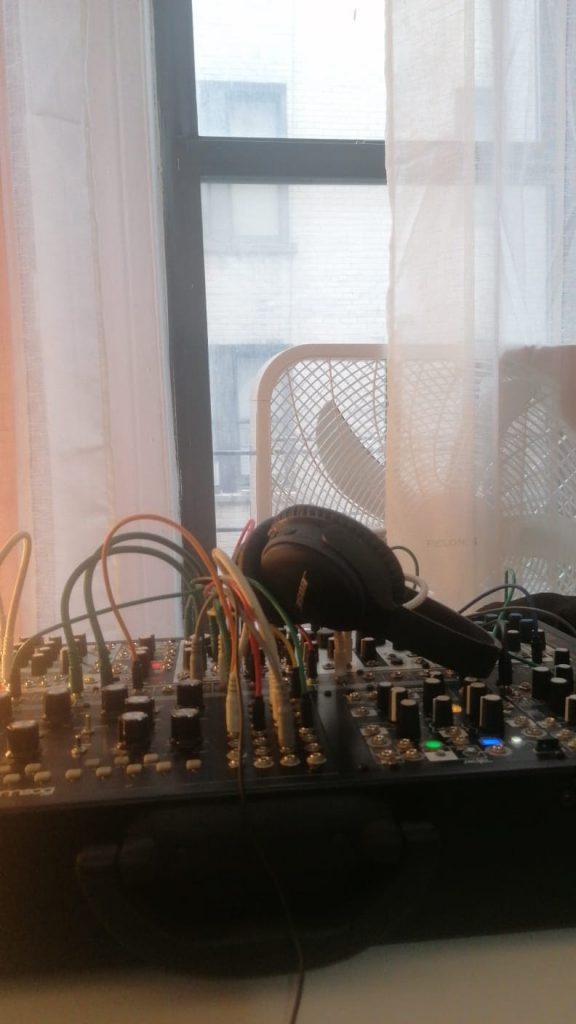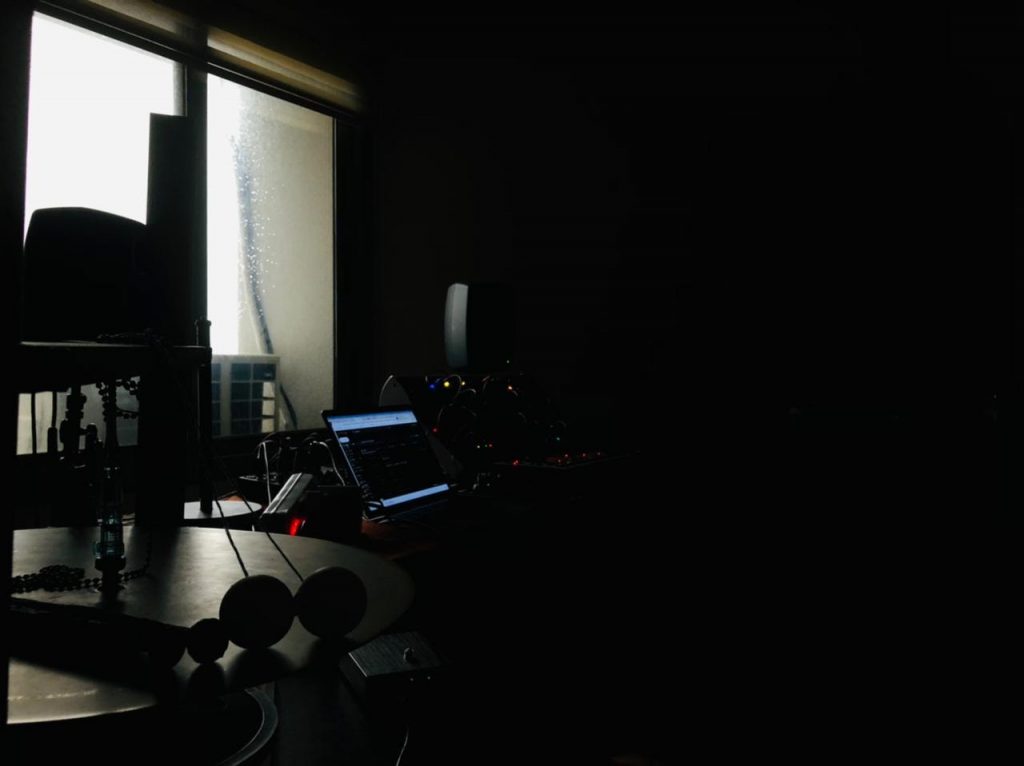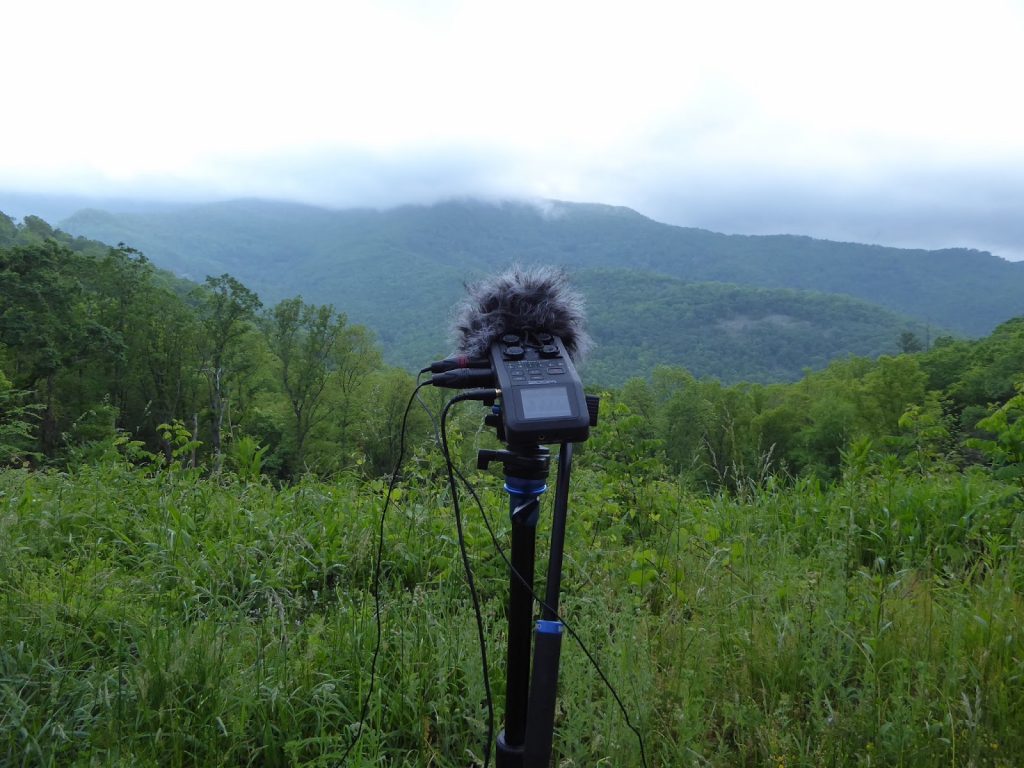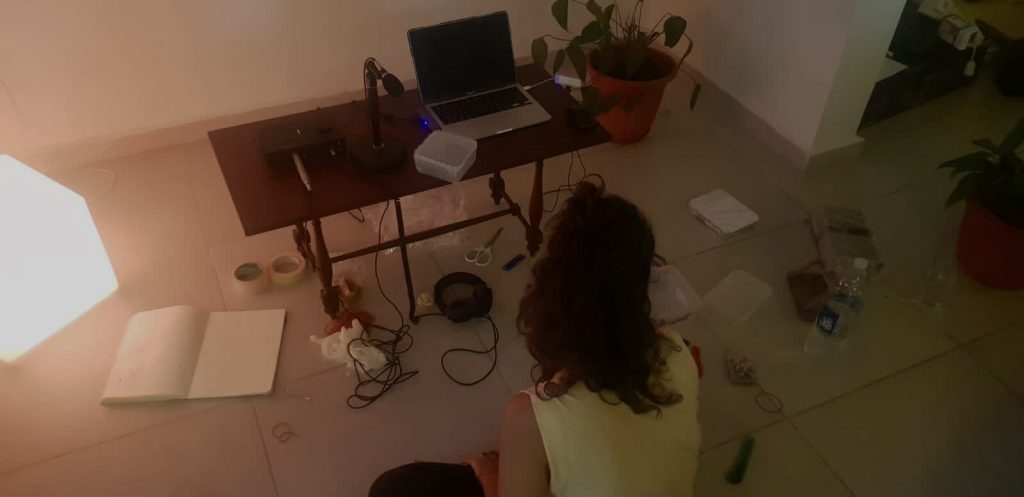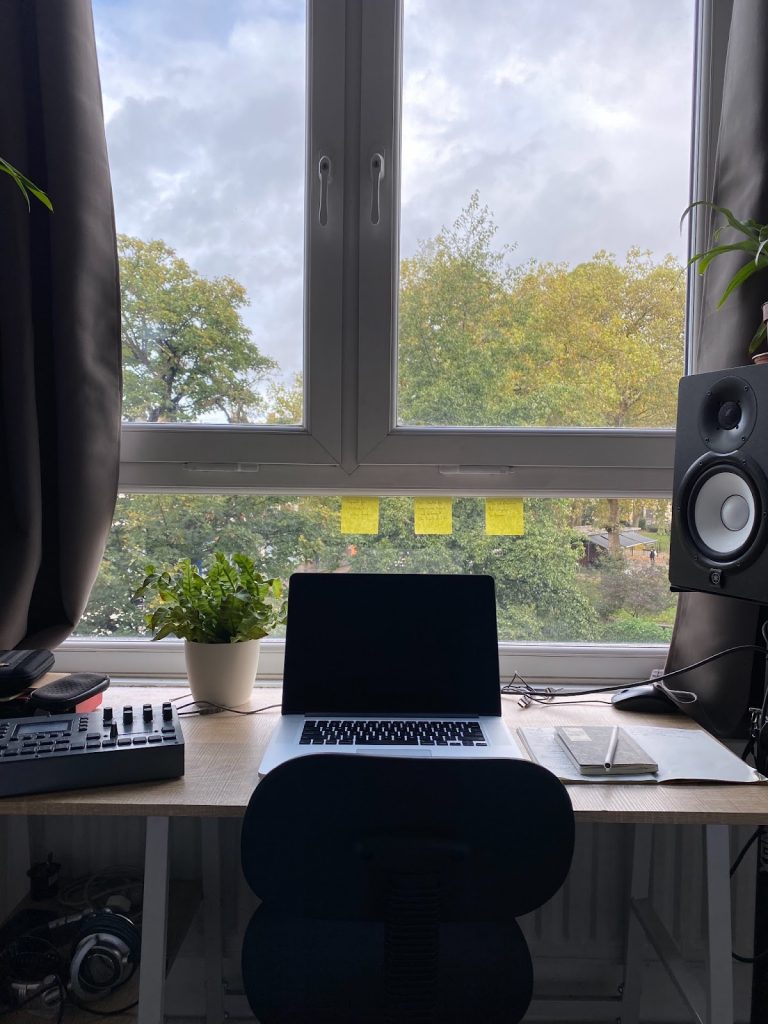ELYSE TABET & SARAH HUNEIDI: SOUND PRODUCTION IN A TECTONIC ENVIRONMENT
ZUIHITSU
QUIRKY THOUGHTS COLLECTION
Essays, personal stories and curiosities from our guest fem人le contributors
ELYSE TABET & SARAH HUNEIDI : SOUND PRODUCTION IN A TECTONIC ENVIRONMENT
We who call Lebanon home have experienced rapid and drastic changes to our environment since October 2019.
Every few months, sometimes even every few weeks or days, we’ve found ourselves compelled to navigate uncanny territory – from the uprising, to the lockdown, to episodes of violence, mass displacement, and eventually, a near-total collapse of resources, including electricity.
In lieu of this, we offer a conversation with some of Beirut’s experimental musicians about the overlap of space, context, and mental states in regards to their craft in a rapidly shifting environment.
To go along with reading, here is a mixtape from the artists (tracklist at the bottom).
By October 2019, I was still living with my friend Joe. We’ve been living together for 7 years now. I had a studio set up in a separate room in the house. I would spend most of my days in that room. When people started taking to the streets I stopped doing music and stopped going into that room. By March 2020 I decided to move out of that house, I went to live in a different space solo.
During the Pandemic, I would go work at Jad’s (friend and electronic musician). We were recording Lattices (Released in 2021) and we would spend a lot of time in his house playing music. I was getting accustomed to the smell of his studio, and the plants. I couldn’t make music in my new apartment – it smelled weird to me. I started fondling with programming again at that time.
After the blast, I kept my gear in my car at all times. I realized then that I felt heavy and hard of moving so now I work almost exclusively in code, because it’s just my laptop. Throughout all this time I always had Tunefork Studios as a safe haven for work. But I got blasted there, so it kind of fucked it up for me for a minute.
Then I cozied up in the new house and started working there, it smelled of Jasmines and there was a wild jasmine branch that was dangling from my neighbor’s apartment that I would stare a lot at swaying in the wind. I then got kicked out of that house. Now I live at Fadi’s. I don’t make music here, I still can’t tell what the house smells like.
My aesthetics haven’t really changed throughout this period, I still love and hate similar things. Music production shifted towards programming though.
Despite being away from Beirut since October 2020, with a migration plan that had started in 2018, my presence there through sonic anchors is prominent. I composed my upcoming album during my few months stay there between March and June 2020, did several performances with a substantial amount of research work on sound, essentially connected to this city. As a researcher and sound artist looking at extreme acoustics, urban geography, and conflict, Beirut never stopped offering material for investigation that reflected on its sonorous and musical condition. Its complex nature, in all its social, political, and geographic facets would directly translate through auditory means. Seeking to find possible answers to why this city had witnessed such an expansive and disproportionally large scene throughout the years was an inescapable question. Through my personal involvement with the metal scene in the early 2000s, to hardcore electronic music scene and the ongoing experimental music scene, the link between sound and geography transcended the matters of style. My explorations into these entanglements became greatly informed by witnessing violence, particularly its sonic realms. As I lived through two armed conflicts, 1996 and 2006, multiple assassinations from 2005 onwards, and various events where loud explosive violence had shaped a specific mode of listening, my attention had shifted on these sounds’ interaction with urban configuration before it gets absorbed by listeners. A transformation between mediums that mostly elicits a traumatic experience, which was a pivotal subject in the post-civil war Lebanese art. Though the overwhelming experience of loud explosive sound is a recurrent topic in the Lebanese milieu, as well as in different conflict-ridden zones, the structures and mechanisms of this phenomenon remained obscure and unconvincing to me. To that end, and for the last three years, I have dedicated all my academic efforts to unpack this issue. Besides my ongoing musical practice, my commitment to this research had informed my relationship to Beirut. Violence and conflict that encircle this acoustic condition had cemented an anxious state that overrode my longing for Beirut. A state that got intensified while the country was hitting rock bottom, my short stays there had turned more defeating and debilitating until chance had favored the prepared mind. Being in Beirut during the 4th of August blast, while drafting an inquiry into loudness and explosive sound added to the overall shock from this calamity. Interest and preoccupation with sound had turned into a shared experience with everyone. Not only a matter of research but a collective infatuation, possibly stemming from collective trauma.
I find it quite challenging to explain what happened to my relationship with music from 2019 until today.
As it all almost feels surreal. The question compels my mind to travel back to a moment I was having on my best friend’s balcony on July 10, 2020. To simply remember the date and year, I scrolled through my phone’s photo archive, as my mental archive has lost a clear sense of chronology. The three of us were sitting there with our bare feet against the wall drinking Beirut beer while eating little pumpkin seeds. We spoke a lot without speaking while playing that game, where we look for light across the Beirut skyline.Light being, electricity. Light being hope. Light being the sound of movement; the cars that were once loaded with a full tank of gas driving across the once sleepless highway. Similar to that game with light, my relationship with sound/music has become about finding ways to fight the notion of disappearance.
To somehow capture what’s left, preserve it and contemplate what could be? Will the highway ever be as noisy as it once was at night? Will the city ever go back to being sleepless and full of life? Will local citizens ever have the same financial means to go out and not have to over worry about every penny being spent?
Loops. Loops. Loops. Focusing on specific phrases from the artistic research that I have been indepthly exploring through site specific interventions, interviews and field recordings has become the new obsession. The desire to prolong a word or a phrase, and translate it over a longer duration has become my new focus. While before I was more keen on creating a narrative or composition that carried several stories. Now rather it has become about thoroughly exploring one feeling. One word or a few words that make a sentence and that sentence in itself creates the narrative for a composition that isn’t bound by a specific time code.
I think for me it depends on what I’m doing… if I’m working with synthesizers, a direct input to headphones, the sound of the space is really disconnected from the experience. For example, when I did the binaural piece I really started using the space around me. I used my house, I used the floorboards, I used the creaks of the floor boards.
When I expanded the work to a different medium, like using microphones, I started thinking about the space a lot more and really thought about every corner of the house. It’s hard to tell because it’s really multidimensional and there are so many factors like the music you are listening to, the state of mind you’re in…
At the Beirut Synthesizer Center, we set everything up, there’s AC, there’s a UPS, open surfaces, we have everything we need yet I’m not able to work there, because of the effect of the city and the external environment. I feel like it’s eating through the walls and through the walls of my brain. It’s harder for sounds to emerge from within when there’s so much information coming to you externally. This is a question I’m exploring… what is the ideal space to work in? The most conducive to creative work, to hear your own thoughts… being able to slow your mind down to be able to create from a deep place as opposed to creating from a shallower place which pulls on things you’ve done before just to get the work done. Getting to a deeper level of focus requires more uninterrupted time, for me at least.
It takes me a long time to arrive in space. To arrive enough to feel like, now I can work. In Asheville I was able to focus on very small sounds… very tiny sounds like the sound of a teacup tinkling… also when you are in a quiet place and have a lot of time, it’s easier to focus on smaller sounds, I can hear my thoughts so I can hear the sounds in the physical space. If you are able to slow your thinking down enough, you’ll pay attention to what you hear in a space. The physical space, the mental space, the environment, the country… all of these factors play in and I’m not able to separate them and compartmentalize them.
As human beings, we’re all sponges and we absorb what’s around us. When we need to express ourselves, we squeeze ourselves, although it’s harder when you’re drained emotionally, physically, mentally.
I’ve produced sounds in Beirut and elsewhere. Elsewhere in a space where everything is available – electricity, water, internet, it’s much “easier”. It sometimes feels like the sponge is dry. For me, it’s harder to squeeze out sounds in places where things are too stable on all levels. It’s kind of more difficult to be expressive.
It’s harder to make sounds here due to the electric cuts. We have to do a bunch of things before we do the actual thing. Taking a shower, for example – we need to consider a lot of things before taking the shower: electricity, hot water, the Water itself.. if all three are available, one can take a shower. The same goes for making music. There the doing is easier, but here it feels more expressive when you do it.
The setup I had when living in Qatar was very similar to the setup in my Beirut studios. It’s also something about the familiarity of the workflow, regardless of the environment. The people – the entourage is different. On a social level, there are also the people you interact with in your daily life before you get home to your studio.
There was a lot of time to make music in Qatar, and yet it always took a backseat. Working with various other musicians since being back to Beirut has allowed me to appreciate the importance of musical dialogue. It’s a harder kind of expressiveness, where I find my parts in the piece and express myself while the other musician does the same and we just work around each other, never overshadowing.
Despite the daily hardships, It’s also been a fulfilling job to collaborate in Beirut, and has been a catalyst of musical productivity.
For me, the lockdown was a fruitful space. Suspended time. Silence. Especially after the previous few months of insanity and emotion in the streets. During the lockdown, I spent most of my days playing long and evolving sets using a synth, the computer, and a VT. I used vocals a lot. The unending quiet and aloneness lead to lots of intro and retrospection, which came out in full, dreamy sounds, drones and treated vocals. When we came out of lockdown and went out into a strange and visibly broken world, my approach and sounds definitely changed. The collapse of stuff around us and the sudden return of the outside world confused me, made me averse to using vocals because i felt tired and didnt want to use words. Whenever I did use them, I buried or entirely distorted them. I began producing harder beats, harsher sounds, lots of noise. When electricity became scarce, making music sort of became a luxury, and came with a level of desperado, as electricity would only come on for a few hours. Stealing moments here and there, when I had time, headspace, and electricity all at once, I started recording bits and pieces and putting them away for later so that I could edit and make music using only a computer when there was no electricity. Working on one piece end to end, or producing a track whole at once, even just playing long, drawn-out sets seemed impossible. My patience was thinner. I began to create tracks basically by collaging stems I would save and seek later. Originally working with words, what drew me to experimenting with music was partly the ability to express without having to mine for wording. Using words as a means of expression became painful. Music offered something else entirely – the ability to build worlds in a process that I find more liberating, less painful and acute, but somehow even more precise.
Home has always been temporary for me; I grew up moving from one apartment to another because my parents never owned a place.
A friend of mine recently told me I brought clutter with me wherever I went; I find myself navigating temporary spaces and carrying with me my clutter of toys and instruments and puppets that have perhaps become the only constant for me. Beirut is scary and things are scary. After going out into the city, I always come home carrying an extra load of fear and uncertainty like it’s a basket of laundry that isn’t mine to be burdened with. I come back to my temporary home i’ve built out of clutter and I wallow in this fear, and try to turn it into something I can hold in my hands, something I can laugh at, something small and stupid and silly
This is a small recorded piece for accordion, metallophone glockenspiel and toy piano into which I’ve incorporated a recording of the calls for condolences I used to hear every day in the apartment I just moved out of, as well as a voice recording from one of my old university professors expressing how worried he is that he might never be able to leave Lebanon to go back to his home during a conversation in which he told me he felt he might die soon and was terrified he would be buried here.
When lockdown first happened, I suddenly was no longer commuting to work and had a lot more time to work on music. There were so many shifts in the external and internal settings in the last two years. The setup got really small and to the point, because it’s been hard to set up in any one place long enough. I had the modular rack and started using it more than ever, and there was something immensely soothing about just plugging in the headphones on a mid-low level and hearing the fluctuating current.
The featured track is created with a sample pack by System Revival’s ‘Beirut Heritage Initiative’ – filled with over 200 recordings from various sounds in and around construction sites in Beirut.
When leaving the country for a few weeks this summer, I was able to listen and sort through stems I had recorded throughout last year in Beirut, only to begin processing them into tracks now. For many reasons, in Beirut it was almost impossible to sit down and listen to recorded sessions.
Definitely, spaces represent people for me. Moments in time and space which I remember most are moments where I am marked by both the place and the presence of the other. Places that were so familiar have progressively started to feel different, as the people who inhabited them left.
Treating sound as overheard and using found sound rhythmics has been a long term process. But everything about the past few years has pushed my work further towards that direction. It’s omnipresent in the way I treat a composition in production, where it has become more of a conscious mental map of visualizing the space the sound is moving in, before it is actually coming into the amplifiers.
Throughout the past 2 years, a lot has changed when it comes to how I make music. In the beginning of the pandemic, I felt that I needed time to reflect and work on my music alone, it was more of a solitary work. which I enjoyed a lot and helped me get technically better at what I do. but after August 4th our surroundings and life dynamics have drastically changed; Which made me feel like collective work is more important and beneficial in such times. So most of my projects were collective, or tackled social “matters” like my BAC micro commission piece “Trigger” or taking part in Kinematic ensemble’s “Al Jadi” release, and releasing music with Anthony Sahyoun and Kid Fourteen. So, I think that my music practice was directly affected by my surroundings. Pre-explosion was a period of self-reflection and isolation, but after the exploration, the need and desire for collective work grew.
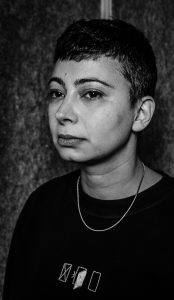
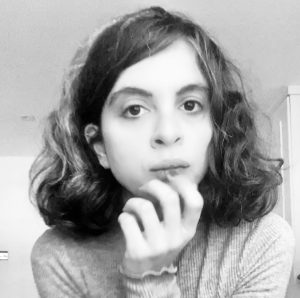
Elyse Tabet works in audio-visual, combining recorded and synthesized sound and processing in daws and samplers to produce electronic music. Her sound focuses on textures and draws from noise pop, musique concrete, ambient, industrial, electronica, dub, and garage beats.
Sarah Huneidi is a writer and editor. She also experiments with digital visual and ambient sound production and editing In 2018, she co-founded Barakunan, an experimental publisher and media collective, where she acts as managing editor and content creator.

